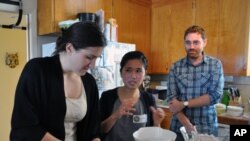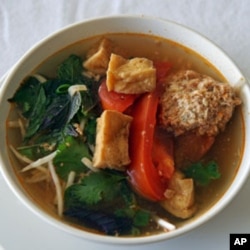You can always check the Internet or a cookbook to learn how to make Vietnamese egg rolls. But Linh Nguyen, who doesn't even own a cookbook, isn't a big fan of those methods.
“In a Vietnamese house, there are no measuring spoons or measuring cups," Nguyen says. "Everything is sort of just done by the handful, or the bowlful. And the recipes are all sort of passed down from one person to another.”
Nguyen teaches that technique for Culture Kitchen, a company which hires first-generation immigrants as cooking instructors. The San Francisco company is trying to revive the lost art of home cooking - which many learned from their mothers or grandmothers - by passing it on to a new generation of students.
Nguyen moved to the United States as a child in the 1980s, and learned to cook from her mother and many aunts. Unlike Nguyen’s family, though, Culture Kitchen teachers do write down recipes.
But they also focus on that person-to-person tradition, showing how a dish should really taste or look when it’s done, and answering all the little questions that come up along the way.
Jennifer Lopez co-founded Culture Kitchen over a year ago, along with business partner Abby Sturges. The concept started as a graduate school program in product design. Lopez looked for amazing cooks who wouldn’t normally be teaching due to a language barrier or lack of formal training. She also reached out to community groups, but ended up with help from surprising sources.
“A lot of our cooks that we’ve had, it’s not necessarily been them that reached out to us," Lopez says. "It’s their sons or daughters who have emailed us and said, 'My mother or my grandmother makes the best food. She’s a little scared, I told her she needed to do this, this is so important.' And those are the moments that are so special.”
Culture Kitchen holds classes about twice a month, often in a donated kitchen, cooking school or community center. Lopez hopes to get a permanent location soon.
The cuisines range from Bengali to Peruvian to Afghani.
No matter where in the world the dishes come from, they seem to have the recipe for genuine connections between people. Student Laurie Mun came to learn Vietnamese cooking firsthand. She learned her family’s Cantonese recipes through the same sort of one-on-one instruction and is grateful for the opportunity, then and now.
“It’s a way I think for us to connect the generations," Mun says. "Like my mom would say ‘My grandmother, I remember watching her do it this way.’ So even though I didn’t have the relationship with her [my great-grandmother], because I was so much younger, she was in the room.”
At Culture Kitchen, classes don’t just keep recipes from dying out, they can also change the how the instructors view themselves.
“A lot of the women we work with don’t have that many friends outside of their own culture," Lopez says. "So the opportunity to share their cuisine with a larger group of people is huge. It’s been phenomenal watching some of our cooks transform.”
They transform into teachers ready to share an important traditional skill with students who are hungry to learn.





